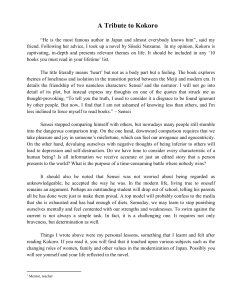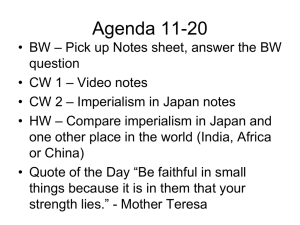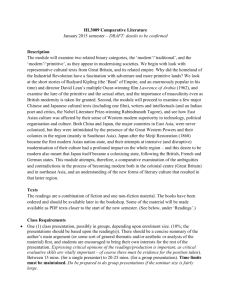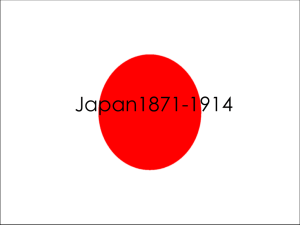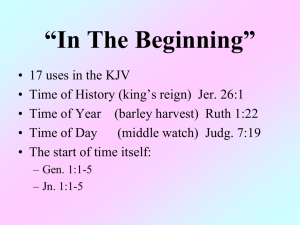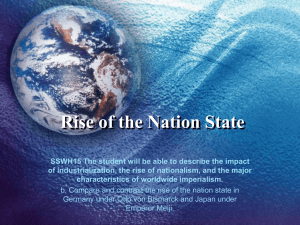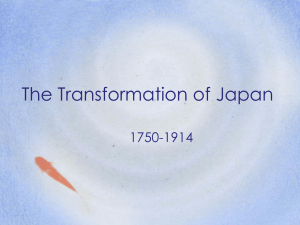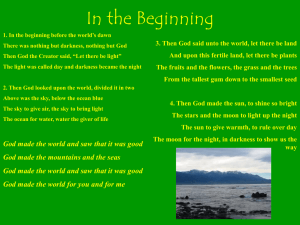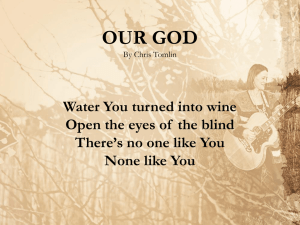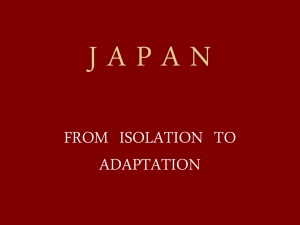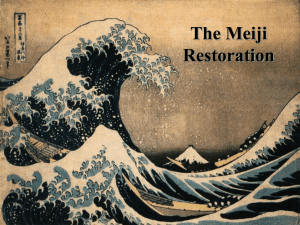Week 9: Kokoro - University of Warwick
advertisement
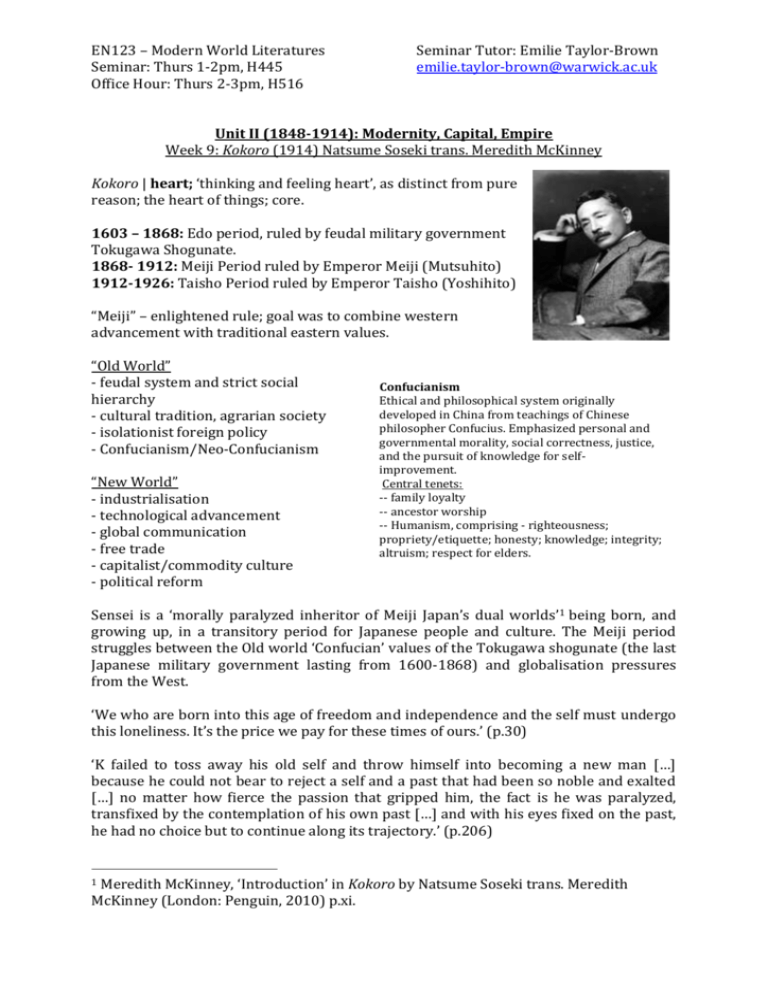
EN123 – Modern World Literatures Seminar: Thurs 1-2pm, H445 Office Hour: Thurs 2-3pm, H516 Seminar Tutor: Emilie Taylor-Brown emilie.taylor-brown@warwick.ac.uk Unit II (1848-1914): Modernity, Capital, Empire Week 9: Kokoro (1914) Natsume Soseki trans. Meredith McKinney Kokoro | heart; ‘thinking and feeling heart’, as distinct from pure reason; the heart of things; core. 1603 – 1868: Edo period, ruled by feudal military government Tokugawa Shogunate. 1868- 1912: Meiji Period ruled by Emperor Meiji (Mutsuhito) 1912-1926: Taisho Period ruled by Emperor Taisho (Yoshihito) “Meiji” – enlightened rule; goal was to combine western advancement with traditional eastern values. “Old World” - feudal system and strict social hierarchy - cultural tradition, agrarian society - isolationist foreign policy - Confucianism/Neo-Confucianism “New World” - industrialisation - technological advancement - global communication - free trade - capitalist/commodity culture - political reform Confucianism Ethical and philosophical system originally developed in China from teachings of Chinese philosopher Confucius. Emphasized personal and governmental morality, social correctness, justice, and the pursuit of knowledge for selfimprovement. Central tenets: -- family loyalty -- ancestor worship -- Humanism, comprising - righteousness; propriety/etiquette; honesty; knowledge; integrity; altruism; respect for elders. Sensei is a ‘morally paralyzed inheritor of Meiji Japan’s dual worlds’ 1 being born, and growing up, in a transitory period for Japanese people and culture. The Meiji period struggles between the Old world ‘Confucian’ values of the Tokugawa shogunate (the last Japanese military government lasting from 1600-1868) and globalisation pressures from the West. ‘We who are born into this age of freedom and independence and the self must undergo this loneliness. It’s the price we pay for these times of ours.’ (p.30) ‘K failed to toss away his old self and throw himself into becoming a new man […] because he could not bear to reject a self and a past that had been so noble and exalted […] no matter how fierce the passion that gripped him, the fact is he was paralyzed, transfixed by the contemplation of his own past […] and with his eyes fixed on the past, he had no choice but to continue along its trajectory.’ (p.206) Meredith McKinney, ‘Introduction’ in Kokoro by Natsume Soseki trans. Meredith McKinney (London: Penguin, 2010) p.xi. 1 EN123 – Modern World Literatures Seminar: Thurs 1-2pm, H445 Office Hour: Thurs 2-3pm, H516 Seminar Tutor: Emilie Taylor-Brown emilie.taylor-brown@warwick.ac.uk Points to Consider: - How is the generational difference emphasised, and what is its impact on the narrative? How does miscommunication function? - What dichotomies are present in the novel? How do they function? - What is the significance of the illness narratives? - Compare the opening sea-side meeting with Sensei’s seaside retreat with K. - How are women presented in the novel? - How is the novel structured? What effect does this have? - What is the significance of ‘money’, ‘love’, ‘sin’, ‘friendship’ and ‘knowledge’? Parallels - Narrator/Sensei - Sensei/K - Narrator’s father/Sensei ‘His Majesty’s illness is a little like my own.’ (p.86) ‘The day word of the emperor’s death arrived, my father groaned aloud, newspaper in hand, “His Majesty has passed away! And I too…” He said no more.’ Use of Nature imagery ‘As the summer’s circada’s strident song gradually gave way to a more hesitant call of the tsutsukuboshi, the fates of those around me also seemed to be slowly turning through the great Karmic wheel.’ (p.94) ‘These tragic winds were penetrating even our distant corner of the land, shaking summer’s sleepy trees and grasses…’ (p.102) Consuming the Body ‘”In the old days children fed their parents, but these days they devour them.”’ (p.93) ‘You revealed a shameless determination to seize something really alive from within my very being. You were prepared to rip open my heart and drink at its warm fountain of blood. I was still alive then. I did not want to die.’ (p.124) Love ‘A man who knows the satisfactions of love would speak of them [the couple] more warmly. But you know . . . love is also a sin. Do you understand?’ […] Do you know why I go every month to visit my friend’s grave in Zoshigaya? (pp.26-28) Out of place, out of time ‘And then at the height of summer, Emperor Meiji passed away. I felt then that as the spirit of the Meiji era had begun with him, so it had ended with his death. I was struck EN123 – Modern World Literatures Seminar: Thurs 1-2pm, H445 Office Hour: Thurs 2-3pm, H516 Seminar Tutor: Emilie Taylor-Brown emilie.taylor-brown@warwick.ac.uk with an overwhelming sense that my generation, we who had felt Meiji’s influence most deeply, were doomed to linger on simply as anachronisms as long as we remained alive.’ (p231) Americanised rationalism and materialism are the antitheses of the Japanese Kokoro or ‘heart’ – that much invoked concept in both advertising and ethnic theorizing, which is also equated with the place of return: that which is uniquely Japanese and native […] the Japanese self […] equals the authentic kokoro, which in turn equals the rural, the remote, non-American, and nonrational. --- Marilyn Ivy, Discourses of the Vanishing: Modernity, Phantasm, Japan (Chicago: University of Chicago Press, 1995) p42. In the late nineteenth century, when the concept of modernity began to prevail over the world, two writers in the East and the West, Natsume Soseki (1867-1916) and Joseph Conrad (1857-1924), shared a pessimistic view of the modern world […] the two novels Kokoro (1914) and Heart of Darkness (1902) share a substantial basis for comparison […] Soseki and Conrad present the predicament of the modern man in which the journey towards enlightenment inevitably leads him into darkness— the darkness of the human heart and of the modern world. --- Asami Suzuki, ‘The Exploration of Darkness; the Darkness of the Modern World in Kokoro and Heart of Darkness’ 跡見英文学 12(1998) p.83. Form The “I” Novel: Japanese literary genre largely developed in the Meiji period, which is characterised by the confessional narrative; often at least partly autobiographical, however it is argued that, although a form of self-expression on the part of the author, it should create a world which is different and autonomous from that of the author’s “I”. The Bildungsroman: a novel concerning the moral, psychological and intellectual growth of an individual (usually a youthful protagonist); a coming-of-age story. Further Reading Gessel, V. C. ‘Probing the Modern Heart: Natsume Soseki’s Kokoro’ available at: http://literatureandbelief.byu.edu/publications/probing_heart.pdf Ivy, M. Discourses of the Vanishing: Modernity, Phantasm, Japan (Chicago: University of Chicago Press, 1995) Kojin, K. Origins of Modern Japanese Literature trans. ed. by Brett de Bary (Durham: Duke University Press,1998) Nae, N. ‘Kokoro ans the Agony of the Individual’ NUCB Journal of Language, culture and Communication 4(2002)2 pp15-23. Suzuki, A. ‘The Exploration of Darkness; the Darkness of the Modern World in Kokoro and Heart of Darkness’ 跡見英文学 12(1998) p.83.
